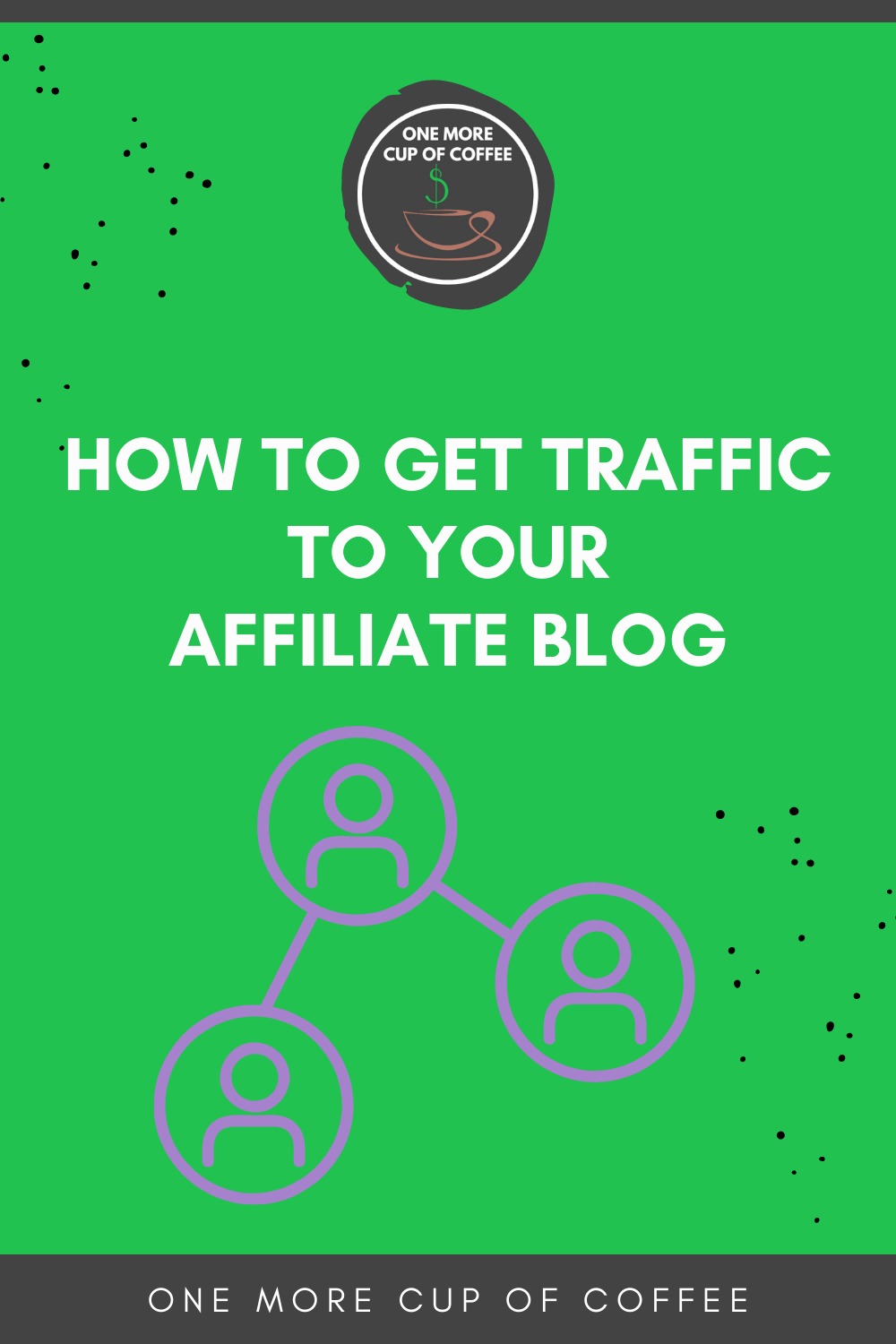
Traffic is massively important to you website. When your website gets traffic it means that real people are searching for stuff online and landing on your website because you have the answers.

Are You Ready To Work Your Ass Off to Earn Your Lifestyle?
Are you tired of the daily grind? With a laptop and an internet connection I built a small website to generate income, and my life completely changed. Let me show you exactly how I’ve been doing it for more than 13 years.
If you are a good writer and chose a niche topic you care about, it’s very likely that you will just naturally start to grow your website traffic without much effort. Write interesting stuff on your blog and traffic will eventually come, no matter what. The cool thing about the internet is that if you are interested in a topic, there are a thousand other people that will share that same interest.
However, most of us are not born great writers, so we have to learn. No problem. I can teach you the basics.
One thing to keep in mind is that we’re building a business, so we have to be intentional about what we write and how often we publish. We are not just a casual blogger that can publish articles when we feel like it. The goal of these lessons is to teach you how to generate income from your blog as fast as possible, so there has to be consistency and intent in your article publishing schedule to achieve that goal.
To earn income we need traffic. To get traffic we need to be publishing articles about stuff people are searching for online. That stuff we publish should be related to the topic of your website in some kind of way – any way you can make the connection.
For example, if your niche is about salt water fish tanks, then you should be publishing articles about stuff like how to clean a salt water fish tank or what the best brand of tank is. Articles like what are the best salt water fish, or why your fish is floating upside down would be appropriate as well.
It would not be appropriate to tell stories about your dog or give advice on how to build a fence. It’s not related.
On this page I’ll just give an overview of how to generate traffic to your website so you can get a broad look at what’s out there. In the next lessons we’ll focus on one specific method, which is generating free search engine traffic, namely from Google.
Though there are many ways to generate traffic to a site, this is the one that I’m good at. In my opinion, it’s the best path for newbies because it’s free to do, and can produce long-lasting results (AKA passive income). I’ll list the pros and cons of a couple traffic methods below.
How To Generate Traffic For Your Affiliate Website
Tracking Your Traffic With Google Analytics
Organic Search
- Keyword Research
- Low Competition
- High Traffic Keywords
- Don’t Forget The Human Element!
- Trending Topics & Geurilla research
Social Media
Should You Worry About Paid Traffic?
Tracking Your Traffic With Google Analytics
How do you know if anyone is actually visiting your website? There are various traffic tracking plugins that you can use, but they normally slow down your site. For example, a plugin called JetPack is very popular, but it drains your resources, making your site slower.
Google Analytics is free, won’t slow down your website, and provides much deeper insight into your traffic, especially if you connect it to Search Console. Most tutorial you see on YouTube have you install another plugin to manage your Analytics code. Booo! That means you’re locked into relying on this plugin forever, and you don’t really need it. All the juicy data is in your Analytics dashboard anyway.
Here’s the rundown of how to install Analytics the right way.
How To Install Google Analytics
First, create your account here. It’s free. Follow the prompts until you get to the section where it asks you to install the code on your website.
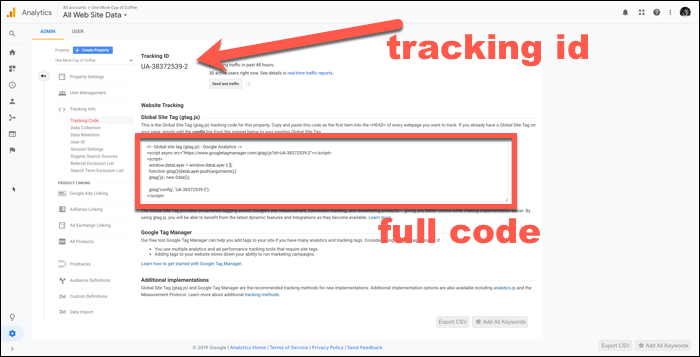
If you have a StudioPress theme like I recommended in previous lessons, your job is easy. Go to Theme Settings, then copy/paste the full code into the Header Scripts section. That tells Google that you want tracking code to track all your pages on your website.
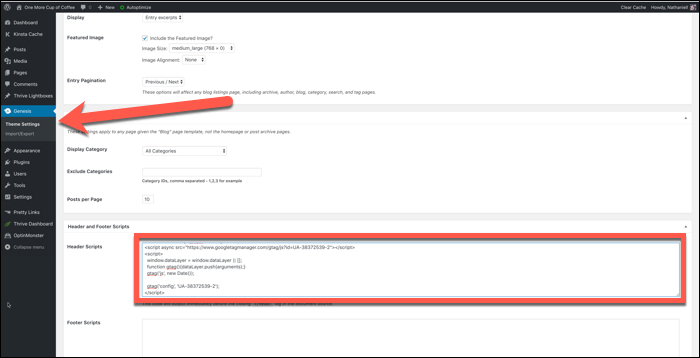
If you don’t have a StudioPress theme, that’s fine too. Hopefully you took my advice and install the All in One SEO Pack. You’ll need to do the following steps to hook up AIO SEO with a plugin called Monster Insights. This is the free version. There’s a paid version you don’t need, so I recommend ignoring it at this point, but you can consider upgrading at a later date if you want more pretty visuals and traffic insights.
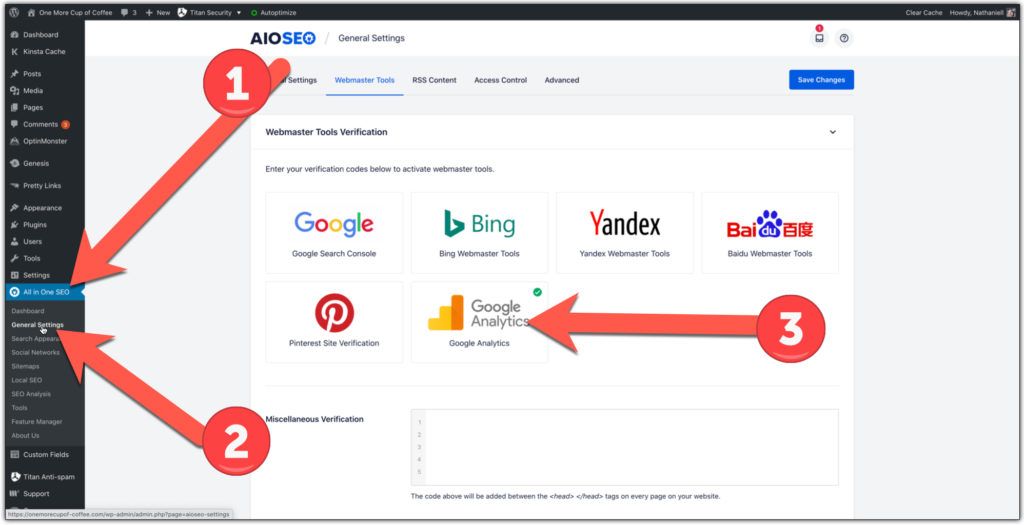
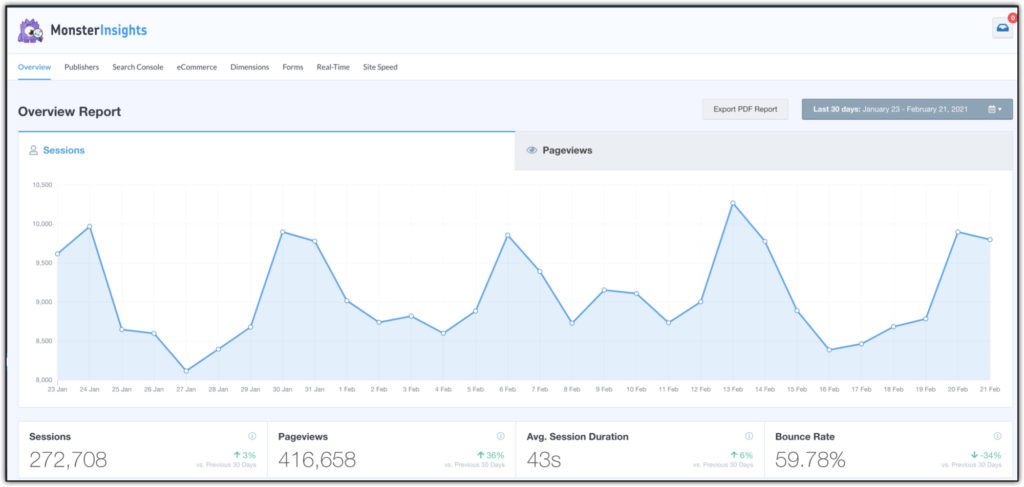
Yes, that’s real data from one of my sites getting almost 1/2 a million page views per month.
One of the most amazing things about having lots of traffic is that you can you can use the data to improve your site in many ways, but the two main ones I employ are as follows:
- Use data to see which articles are the most popular, then double down on those topics
- See which articles get the most traffic, then optimize affiliate conversions for those pages
Without this data, you’re shooting in the dark. Knowing where you traffic comes from allows you to tweak your business on the fly, making small changes over time.
For example, I started a website about brewing beer at home. I published things like beer recipes, beer reviews, and some top-10 lists.
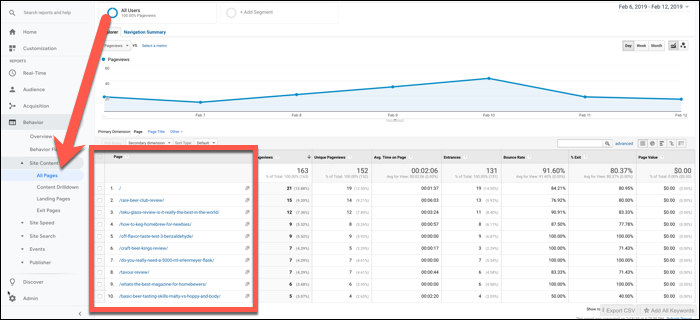
When I looked in Analytics, I could see that my most popular posts were monthly beer club reviews and off-flavor tasting notes. From this data, I realized it was a good idea to focus on publishing as many beer club reviews as I could, especially since this was an opportunity to make money with affiliate links.
Generating Organic Search Traffic
Keyword Research (Briefly)
Especially when you are just starting a new website, it can be hard to make sure your stuff gets discovered. There’s a lot of noise online, and competition is fierce. The entire world is competing for just 10 spots on the first page of Google!
Actually, the situation is not that dire. It’s pretty damn easy to rank on page one, spot #1 if you know what you’re doing. We’ll cover how I do keyword research in a the future lesson, but the details right now will probably confuse you. In this section about traffic I just want to briefly cover the basic concepts.
Low Competition Keywords
When you start out your website, competition can seem overwhelming. How on Earth are you going to compete with websites like Buzzfeed and Forbes? NerdWallet and Amazon?
The good news is that with good keyword research, we won’t have to compete with the big players.
Firstly, we have insider knowledge (because we’re experts), so we can write about stuff the big guys don’t know about. That guy writing about craft beer on Buzzfeed? He doesn’t know shit about craft beer. He’s just a writer-for-hire grinding out content because his boss tells him to do so.
We are the craft beer experts! We take the time to do the proper research and write content that craft beer enthusiasts actually want to read. Your average person doesn’t know this, but people who care about good beer can tell the difference.
Also, we will target much more specific ideas because they are lower competition. Forbes and Business Insider publish articles like “best beers of 2020”, but we’ll publish stuff like “best Mexican lagers you can buy in the USA”. As a rule of thumb, more specific = less competition.
After you rock low competition keywords for a while, you can start to target higher competition areas, funneling traffic from “easy” keywords to “hard” keywords, driving up your rank in Google search.
Our traffic-building process basically it works like this.
- Find low competition keywords
- Optimize each article for a single keyword
- Create large amounts of these types of posts over time
- Start publishing content on higher-competition topics (takes longer to make)
- Link low-competition pages to high-competition pages to funnel traffic and build authority
What’s the best way to start a fire? Do you throw a match on a walnut log? Nope.

Start with the easy stuff, then build up to the harder stuff You start with kindling and paper – the stuff that’s easy to burn. Then you add some thicker sticks.
Then you toss on a big, hardwood log, and that log will burn for a long time, just like your website will be around for many years once you start getting evergreen rankings for competitive phrases.
High Traffic Keywords
To figure out what high traffic keywords are, you’ll need a keyword tool. A keyword tool can tell you which topics are more frequently searched in comparison to other related terms. For newbies, I recommend Jaaxy ($49/month). For advanced users with a budget, I like Ahrefs ($99/month).
For example, if someone wants to build a shed, are more people looking for “how to build a backyard shed” or “how to make a DIY shed”. The phrases have a similar meaning, but they are not exactly the same, and will turn up different results.
Researching keywords can help you discover what people are searching for, and write your article in a way that resonates with them. Volume numbers are rarely exact, but can be used as guideline to see which terms have more traffic potential.
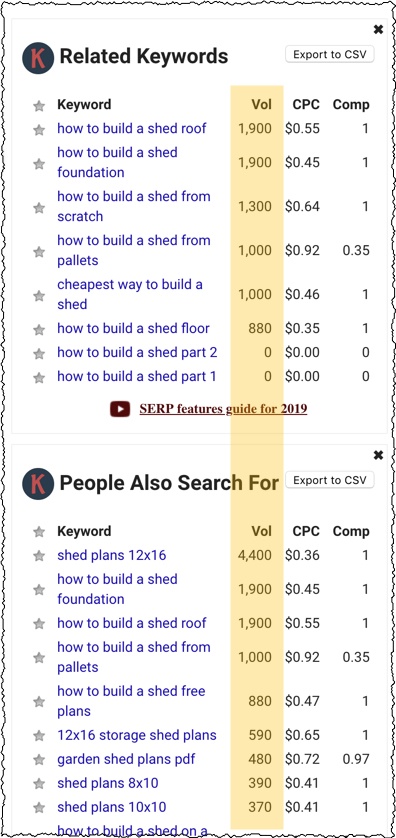
Do Not Forget The Human Element!
My #1 pet peeve about newbies learning keyword research is that they rely on tools too much, and don’t think about what humans are actually searching for.
Do you want to read a post titled, “Prepare Marathon Beginners: A How To Guide” or would you more likely click on something titled “Beginners Guide To Preparing For A Half Marathon”?
The clear answer is option #2. It sounds like a human wrote it.
When you write, make sure you have a human in mind. Writing for search engines can get you ranked, but ultimately our goal is to get humans on our website that want to click and buy the stuff we recommend. Google isn’t going to buy anything from your site.
Trending Topics & Guerrilla Research
Keyword tools are just a tool. We use them to figure out what humans are searching for. Unfortunately, many affiliate website owners limit themselves to writing only what a tool spits out, and they leave a lot of traffic & money on the table.
Using guerrilla research techniques, you can uncover what real people are talking about online. Traffic estimates?! We don’t need no stinking traffic estimates!
One of the simplest ways to figure out what to write about is to leverage Google Instant. Type in a phrase, then use variations to see what Google predicts. With just three variations (a, b, c), Google generated 30 unique ideas that would be perfect for an entrepreneur-related niche website.
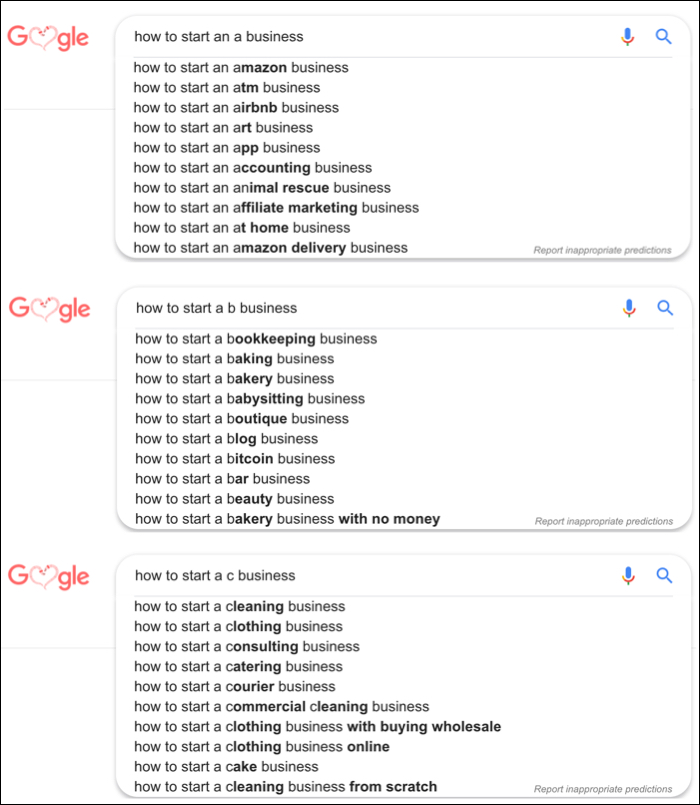
What’s even crazier is when you start digging deeper, and you realize the insane potential of your website. Just riffing on the idea of how to start a consulting business (one of the results above, see what Google instant returned so far…
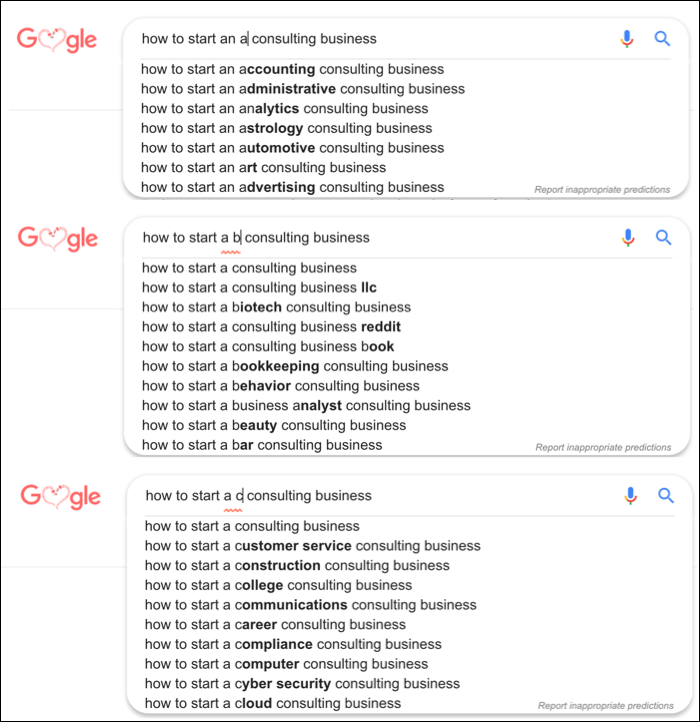
These are real things that people are searching for online. We’ve gone from “how to start a business” (broad topic) to “how to start a cyber security consulting business” (narrow topic). This is just the tip of the iceberg!
Other ways to find trending topics to write about would be to check social media. Look for trending hashtags on Twitter. Look for what new products people are talking about for product review ideas. Find out what issues people are having then create a tutorial on that topic. Look in forms and Reddit to see which posts get the most discussion to gauge what buttons your audience has.
Just by browsing a survival subreddit I found the most popular topics in recent days were survival fiction book recommendations and how to do an urban bugout. The former got the most comments (23), and the latter had the most upvotes (47). People are talking about this stuff!
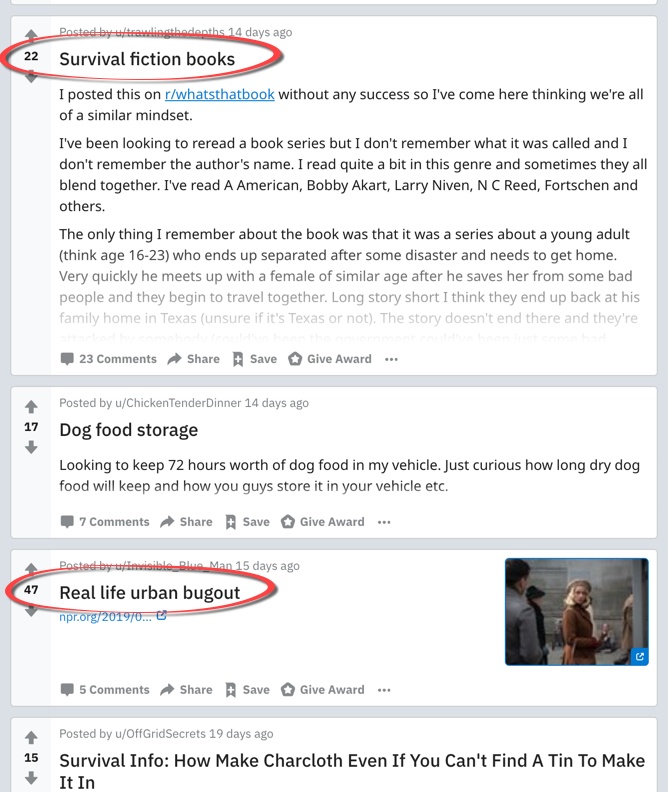
Social Media For Free Traffic
Leveraging social media for traffic is NOT about spamming your links everywhere. This behavior sucks, and everyone hates it. We need genuine engagement to make social media work for us.
Engagement Is Key
Generating engagement on social media is another reason why I recommend you build websites about things you care about. Being genuinely interested your niche means that you’ll enjoy things like:
- Follow influencers in your niche
- Join the top social communities (Facebook, Reddit, Twitter, etc)
- Comment on posts
- Ask good questions
- Offer unique perspectives
BE REAL. You may think you are being sneaky but people are savvy.
Your genuine engagement will grow your followers and, for example, if you have your website in your bio you can get traffic to your blog that way.
You don’t need to be dropping links telling people how awesome your most recent article is.
Hang out in the right social groups, and people will be interested in what you have to say. For example, I saw a guy called Brulosophy on Twitter commenting on one of my favorite homebrewing podcasts. His logo looked cool and he had something insightful to say, so I checked out his profile and saw he had a homebrewing website.
Now I know his brand, and recommend his website all the time.
I’ll be honest – social media is tough for me. I’m not very good at it. Actually, I don’t do it for any of my successful blogs, so I’m not going to tell you it’s required. I know that many people hate social media like I do.
However, it can be very effective, and if you aren’t doing it, you’re leaving traffic on the table.
Try to think of it as time spent learning more and more about your niche. Learn about the people. Listen to their problems and find solutions for them.
Did someone just complain about the stitching in their leather jacket breaking? What happened, why, and how did they fix it? Write an article about it. Next time it happens to someone else (and it will), they’ll search in Google and find your article about how to DIY fix leather jacket stitching.
Social media traffic can be a painfully slow process, and very hard to measure results. It’s even harder to not get distracted by all the useless content people share. I’ve wasted hours just watching YouTube videos I didn’t intend to watch just because I fell for clickbait and got distracted.
The best way to approach SM is have a daily plan of what you do or how much time you do it, and stick to the plan. Every few months, take a look at what you are doing and see if it’s working for you. Increase or decrease or alter your plan from there.
At the end of the day, social media is free traffic, and if you build a strong following you can have a serious income from social media alone. I had a Pinterest pin go viral one time, taking one single page on my website from 50 visits a day up to 2,000 per day, almost tripling my daily ad income. Some people make $100,000 or more with recipe websites and they get a large chunk of their traffic from Pinterest and Facebook.
I’m personally not a huge fan of social media, but it’s a resource a lot of affiliate marketers ignore!
Collaborations & Outreach
To tell you the truth, I haven’t done too much of this style of marketing, but collaborations and outreach are a great way to get high quality traffic on your site. This can be directly, through a link, or indirectly through brand recognition.
By contacting and working with influencers who have tons of followers, you will be exposed to a whole new audience. However, to collaborate, you also have to bring something to the table. That means you need to work on creating quality content and becoming an expert in the meantime.
A person with 100,000 followers on Twitter is not going to do an interview with you if you just started your website last week and have two followers.
These people are busy. They have businesses to run. They’d rather collaborate with someone who is at their level. They might not even respond, or they might politely decline. It’s frustrating, but understandable.
As an alternative, start looking for your own peers to work with. Exchange blog posts and share a link on your profiles. Your audience sees them, their audience sees you.
Here are some possible ways to work together with people in your niche:
- YouTube live event
- Zoom interview or Q&A
- Guest blogging
- Coordinated topic posting
If no one wants to work with you, it’s time to self-reflect and see what you can improve on your website. Build out fresh content for a couple months, and keep interacting on social media. Here some ways to get some attention:
- Tweet questions at experts
- Comment on authority blogs regularly
- Do an “expert roundup” post that includes facts about experts
- Ask a brief question of several experts then curate their answers into a list
Should You Worry About Paid Traffic?
Paid VS Free Traffic
You can run your entire business without ever paying for any traffic. The trouble with PPC is that it costs money to make mistakes. If you drive traffic to a page on your website for just $0.50 per click and you get 1,000 clicks, that’ll cost you $500!
What that means is you’d better be sure that the page you send clicks to can convert to sales and earn you a net profit. $100 in paid traffic that creates $200 in sales is a profit of $100, so you did a good job if that’s the case.
What’s more common is that you spend that $100, only earn $20 (or even $0!), meaning you lost money on that campaign.
If you lost $80 like in the example above, the next “proper” step would be to optimize your page. So on the second day, you also set your ad spend to $100, and hopefully you earn $30 instead of $20 like on the previous day. After some days or weeks of tweaking your ad settings, ad copy, and landing page, you finally have a campaign that earns a net profit. It took some initial investment, but now you can rinse and repeat this ad for similar topics.
That’s how paid traffic works, whether you use Google Adwords, Facebook Ads, Bing Ads, or some other paid ad platform. However, most people don’t get to that stage because they hate losing money.
The main advantage to paid traffic is that you get instant results. Within a day you can be sending hundreds of visitors to a single page on your website. You have full control of the traffic flow, and can tweak or test things on the fly.
Contrast that with organic traffic, where you might spend a lot of time creating an article but that article doesn’t rank or generate income.
Ultimately, you have to decide whether you want to risk time or money.
Testing and failure is part of the learning process. The question is, would you rather test and fail for free, or have it cost you money? Most newbies opt for the free failures of organic traffic.
I won’t dig too much into PPC over the course of these lessons because most beginners are not interested, and I myself am not an expert.
Main PPC Opportunities For Beginners
The main places to start with PPC are going to Bing Ads and Facebook Ads. Both platforms have relatively cheap ads and are forgiving if you break their rules once or twice. Bing is probably the easiest to see results because with Facebook, you get a lot of social noise that (at least for me), makes it hard to create good ads.
My advice is to start with Bing Ads for your first PPC platform if you want to try it out. (==> Setting Up & Refining a Bing Ad Campaign 10-Lesson Course)
Adwords is Google’s ad platform. There’s wayyyyyy more traffic and opportunity to explore with Adwords, but that comes at a cost. Ads are more expensive, and their rules are very strict. Historically, Google has been very unforgiving to rule breakers and there’s no customer support line to plead your case. Before you start with Adwords, really try to read and understand their policies!
Every Website Starts At Zero
Every new affiliate marketer starts from zero. I blogged every day on One More Cup of Coffee for 6 months, with less than 10 visitors per day. Now I get 5,000 – 10,000 visits per day, and my website earns me a full time income.
It takes time to build trust and authority in Google, but if you publish content consistently and seek to improve your content over time, traffic will come.
In the next lesson we’re going to dig deeper into basic keyword research and look at how to find keywords, how to turn your keywords into usable titles & topics, and how to optimize your content for a specific keyword.

Nathaniell
What's up ladies and dudes! Great to finally meet you, and I hope you enjoyed this post. My name is Nathaniell and I'm the owner of One More Cup of Coffee. I started my first online business in 2010 promoting computer software and now I help newbies start their own businesses. Sign up for my #1 recommended training course and learn how to start your business for FREE!

 Why Am I Ranking in Bing But Not Google?
Why Am I Ranking in Bing But Not Google?
Robin
Hi Nathaniell,
I just found your site and love it! I’ve always been so afraid to do blogging and affiliate marketing because it seemed so complicated. I randomly came across your content on Pinterest looking for something else and and I can’t stop reading! Your content is easy to follow. So thank you!
My question is this, you don’t mention using Google adsense keywords as a way to research keywords. Is it ok to use that as as a tool even if you don’t plan to run Google ads? Why or why not? Thanks so much.
Nathaniell
Perhaps you mean “Adwords” instead of “Adsense”? I don’t use Adwords at all. It used to be popular back in the day, but people figured out the metrics were off, and they removed free access to the tool (only for Adwords users now), so it’s not very popular at the moment. I’d stick with something like Jaaxy or Ahrefs (my review needs to be updated) but you can really find a lot just from using Google search (autocomplete). Here are my main two keyword research trainings: Simple | Advanced
Suha
Hey Nathaniell!
Noticed you has recommend Keywords Everywhere as a free resource, back before it became a paid service.
If your audience is still looking for a free alternative, I’d love to throw our launch into the ring 🙂
Our free chrome extension – WhatsmySERP.com/everywhere gives you unlimited searches for volume and CPC.
It’s growing fast, has 5 star reviews and 20k+ users. I’d love for you to try it and see what your thoughts are.
Christel Dialava
Hi there,
Absolutely love your insight and tips about how to start as an affiliate marketer.
Thanks a lot for those precious information.
All the best in your endeavours.
Christel
Nathaniell
Thanks Christel! Good luck with your sites 🙂
manu
Hey Nathaniell,
Great content, thanks!
However, I’m not sure that AdWords costs really more than FacebookAds. Think this really depends on the context and on your targeting.
On my side, in the context of an e-commerce website, I got better results with AdWords (whereas I was expecting to get better results with FB ads and all the possible visuals/slide shows/video content…
Will launch my first affiliate website and will keep you posted about my results!
Keep on the good work!
jude
Great info
Nathaniell
Thanks brah.